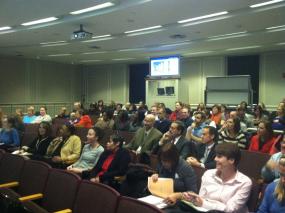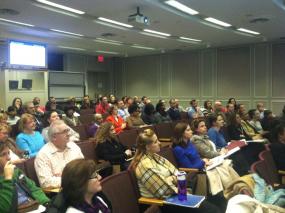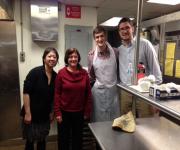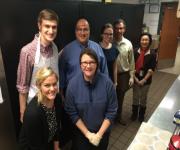Welcome to the third edition of our bi-monthly e-newsletter, Workday@Yale, with news on the University’s transition to the campus-wide unified Human Resources, Payroll and Finance information system, Workday. Workday is a next generation business system that will enable Yale University to improve the delivery of business services across finance and human resources functions.
The Workday@Yale newsletter is one way we will keep you informed with insights and program updates on an ongoing basis. We are off to a great start and look forward to working with you and hearing from you. Please send your comments to us at Workday@Yale.edu.
View the program's Implementation Plan Roadmap
What’s Been Happening?
The Workday@Yale program offered a Workday Overview auditorium session at the Yale School of Medicine on Wednesday, December 11, 2013. The informational session, presented by Jacqueline Tucker, Program Co-lead, focused on the Workday@Yale Program, the Workday solution, program objectives, approach, and timeline.
If you missed the December 11 session, there will be additional sessions such as these across the Yale Community in the near future.
On January 29, 2014, The Workday@Yale program held a Lunch and Learn at 25 Science Park. The informational session, presented by Marc Ulan, Program Co-lead, highlighted accomplishments from the vision and planning phase and provided updates on Program objectives, approach, and timelines. The session was recorded and can be found on the website along with the presentation.
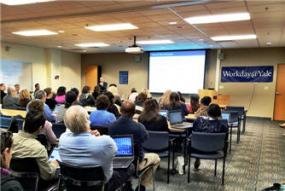
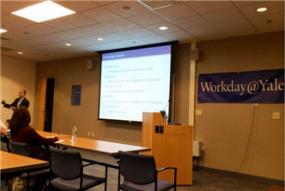
Lending a Helping Hand
On January 14, 2014, The Workday@Yale program team banded together to offer a helping hand at Columbus House, a Connecticut-based, non-profit organization that is passionate about working together to end homelessness. The team helped with food preparation service and even cleaned a few dishes!
Community Perspective
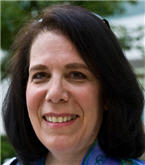
The Workday@Yale Change Management (CM) team recently spoke with Sandra Stein, Service Group Director for Finance and Business Operations, to discuss Service Groups and how they will partner with the Workday@Yale program to help facilitate a successful transition to the Workday system. Sandra, more commonly known around the Yale Community as Sandy, has worked at the University for 13 years in the School of Medicine. For the past nine years, Sandy served as Lead Administrator in the Department of Diagnostic Radiology, a role which provided her with a fundamental understanding of business process and system requirements from an end user's perspective. Her appreciation for the user’s needs allows her to serve as both an intermediary and facilitator for the Service Groups on the Workday@Yale Team.
CM: What role will Service Groups play in the Workday@Yale Program?
SS: Each Service Group will help us think collectively about how the University can create a more service-oriented culture. They are a community engagement vehicle to champion new processes and define value from the user point of view as well as identify the desired service levels. The primary goal of the service groups is to improve overall user satisfaction with services that support the administrative and financial work that is done every day at the University. The focus of the Service Groups is on end-to-end service design, which incorporates the changes that will evolve from the Workday implementation. Review of the revised business processes in Workday with the user in mind will enable us to streamline our workflow and provide improved services to faculty, staff and students.
CM: What are the key factors that will enable Service Groups to be effective?
SS: Service Groups will include approximately ten members—a leader and general members—with representation across the University and down into the organization (i.e. administrators, managers, staff and faculty, etc.). Staff members will be nominated through a web-based form, and must be approved to participate by their Lead Administrator. Sign-off by Lead Administrators indicates that their staff member is well-qualified to serve on the group, possesses strong communication skills and is a team player with an institutional view. This process will enable Service Groups to be most effective by ensuring membership is well-rounded with individuals who are capable of making significant contributions to the group. The training that will be available to the Service Groups as well as the administrative support from Business Operations will contribute to the success of these teams.
CM: How is Yale’s approach for the Workday transition different from other strategies used in the past?
SS: I think the critical difference between Workday and past large-scale implementations at Yale is the expanded focus on Service Groups and Change Management. There is a tangible interest in making administrative work easier and more efficient for the user, by including the user in the review and design of the services. I also think engaging the Service Groups at the right time and training them to analyze changes, make suggestions, and understand the new workflow look and feel is extremely important.
CM: Any final comments?
SS: The current emphasis on Change Management, and training and developing the skills of the Service Group teams, creates a new resource for the Yale community. It is my personal belief that we can identify a common core of business and service requirements that works for at least 80% of the users, no matter where you’re located on campus. The Service Groups will have the opportunity to identify these commonalities across a service which will facilitate the simplification and standardization of how administrative services are provided to faculty, students and staff.
Perspective from the Workday@Yale Program Office
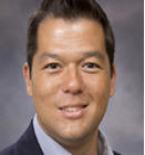
The Workday@Yale Change Management (CM) team sat down to interview Ryan Schlagheck (RS), Program Director for the Workday@Yale Program. We asked him about his background, his current role, and his views on what the cloud-based Workday solution means for Yale.
CM: Can you tell us about yourself, your work experience and when you started working at Yale?
RS: I have been at Yale just over a year and a half serving in the role of Program Director for the Workday@Yale Program. Prior to Yale, I spent ten years in Healthcare IT and worked in support of the first and second rounds of healthcare reform, first with HIPAA and the Patient’s Bill of Rights, and recently with the Affordable Care Act. I held a number of Program Management roles, including the plan, build and run phases of several technology transformation programs and have also led large, global application development and production support teams. Prior to that, I was a management consultant doing primarily integrations and systems development work in a variety of industries, including Supply Chain Management and Distribution, Marketing and Merchandising, and Printing and Publishing.
I had worked on ERP implementations very early in my career but held only cursory knowledge of Higher Education as an industry, so the opportunity to come to Yale and make a meaningful contribution, while gaining exposure to how the University operates was too good an opportunity to let pass. And, Yale is an amazing place with a rich history, and it sounds cliché, but I really do get to meet and work with many interesting people with very different backgrounds. It’s very exciting.
CM: Can you elaborate on your role at Workday?
RS: As the Program Director for the Workday@Yale Program, I am responsible for the scope, schedule, cost, resource management, and quality aspects of the Program. Simply put, it means I am the person responsible for keeping close tabs on the health of the Workday@Yale Program, where the attributes I just mentioned are the program’s ‘vital statistics.’ The Program is made up of several teams, all working within and across each other to deliver value and benefit to the Yale Community. As a result, a key part of my role is to make sure that’s happening, that everyone has what they need when they need it to get their work done, and that barriers to progress are removed before they cause a problem. Finally, I am responsible for ensuring we are spending the right amount of time, money and resources on the right things at the right time.
CM: What can people around campus expect within the next 6 months to a year with regard to the transition to Workday?
RS: In the next six months, the members of our Yale Community can expect to hear from various Workday@Yale Program leaders about the ways Workday will be different, better, simpler, etc. In addition to engaging the Community in a dialog on how Workday will change the way we work, members of the Yale Community will also have the opportunity to see prototypes we’ve built during the development cycle and will be invited to check out free trainings. Looking a little further out, in a little over a year from now we will be readying the Yale Community for our first Workday release. The campus can anticipate a targeted Go-Live date during the second quarter of 2015.
CM: What are some of the challenges facing a large-scale ERP project like this?
RS: While there are several I could pick from, the biggest challenge I see for us, which is a challenge common across all large implementations, is managing scope and making sure we deliver what we said we would, when we said we would. This can be very difficult – our current financial climate and existing system complexities present some very real challenges we need to overcome to achieve success. The Program’s Steering Committee has been very supportive of the approach, timeline and investment required to deliver this important work, and I’m confident their support will continue as long as the Program continues to deliver value and benefit to the Community.
CM: What are some best practices and strategies for Yale moving forward?
RS: I don’t think anyone would disagree with me that Yale is a complex place. And this is coming from a person who worked in the healthcare sector for a decade! I don’t know if it’s a best practice so much as an operating principle, but I think we need to look for ways to make things simpler in everything we do. I am formally trained as a Six Sigma Black Belt, and while the words sound fancy, the fact is that it taught me how to think about simplifying processes so that they add value to someone or something, rather than adding administrative burden. So if there was something I’d want to keep at the front of our minds as we design the future of our HR, Payroll and Finance systems, it would be to simplify, simplify, simplify while ensuring the end user receives a real benefit from the process.
As a closing remark, I just want to add that I and my colleagues on the Program very much look forward to rolling up our sleeves and working shoulder-to-shoulder with members of the Yale Community on this important endeavor. Personally, I consider it a privilege to work within and among some the brightest faculty and staff in academia to deliver this Program to the Yale Community.
Did You Know…Workday uses a leading-edge technology technique called "in-memory" processing, where the entire application and all of the data are loaded into resident memory. This helps Workday achieve lightning quick response times, even when performing complex business processing or accessing large volumes of data.
QUOTE of the DAY
“Things work out best for those who make the best of how things work out”
-John Wooden
